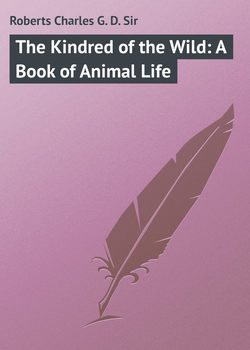Читать книгу The Kindred of the Wild: A Book of Animal Life - Roberts Charles G. D. - Страница 4
The Moonlight Trails
III
ОглавлениеThat night the moon rose over the young fir woods, blue-white and glittering as on the night before. The air was of the same biting stillness and vitreous transparency. The magic of it stirred up the same merry madness in the veins of the wild rabbits, and set them to aimless gambolling instead of their usual cautious browsing in the thickets of yellow birch. One by one and two by two the white shapes came drifting down the shadowed alleys and moonlight trails of the fir wood toward the bright glade which they seemed to have adopted, for the time, as their playground. The lanes and ways were many that gave entrance to the glade; and presently some half dozen rabbits came bounding, from different directions, across the radiant open. But on the instant they stopped and sat straight up on their haunches, ears erect, struck with consternation.
There at the mouth of one of the alleys a white form jerked high into the air. It hung, silently struggling, whirling round and round, and at the same time swaying up and down with the bending of the sapling-top from which it swung. The startled spectators had no comprehension of the sight, no signal-code to express the kind of peril it portended, and how to flee from it. They sat gazing in terror. Then, at the next entrance, there shot up into the brilliant air another like horror; and at the next, in the same breath, another. The three hung kicking in a hideous silence.
The spell was broken. The spectators, trembling under the imminence of a doom which they could not understand, vanished with long bounds by the opposite side of the glade. All was still again under the blue-white, wizard scrutiny of the moon but those three kicking shapes. And these, too, in a few minutes hung motionless as the fir-trees and the snow. As the glassy cold took hold upon them they slowly stiffened.
About an hour later a big red fox came trotting into the glade. The hanging shapes caught his eye at once. He knew all about snares, being an old fox, for years at odds with the settlement of Far Bazziley. Casting a sharp glance about, he trotted over to the nearest snare and sniffed up desirously toward the white rabbit dangling above him. It was beyond his reach, and one unavailing spring convinced him of the fact. The second hung equally remote. But with the third he was more fortunate. The sapling was slender, and drooped its burden closer to the snow. With an easy leap the fox seized the dangling body, dragged it down, gnawed off its head to release the noose, and bore away the spoils in triumph, conscious of having scored against his human rivals in the hunt.
Late in the morning, when the sun was pale in a sky that threatened snowfall, the boy and Andy came, thrilling with anticipation, to see what the snares had captured. At the sight of the first victim, the stiff, furry body hanging in the air from the bowed top of the sapling, the boy’s nerves tingled with a novel and fierce sense of triumph. His heart leapt, his eyes flamed, and he sprang forward, with a little cry, as a young beast might in sighting its first quarry. His companion, long used to the hunter’s enthusiasm, was less excited. He went to the next snare, removed the victim, reset the catch and noose; while the boy, slinging his trophy over his shoulder with the air of a veteran (as he had seen it done in pictures), hastened on to the third to see why it had failed him. To his untrained eye the trampled snow, the torn head, and the blood spots told the story in part; and as he looked a sense of the tragedy of it began to stir achingly at the roots of his heart. “A fox,” remarked Andy, in a matter-of-fact voice, coming up at the moment, with his prize hanging rigidly, by the pathetically babyish hind legs, from the grasp of his mittened fist.
The boy felt a spasm of indignation against the fox. Then, turning his gaze upon Andy’s capture, he was struck by the cruel marks of the noose under its jaws and behind its ears. He saw, for the first time, the half-open mouth, the small, jutting tongue, the expression of the dead eyes; and his face changed. He removed his own trophy from his shoulder and stared at it for some moments. Then two big tears rolled over his ruddy cheeks. With an angry exclamation he flung the dead rabbit down on the snow and ran to break up the snares.
“We won’t snare any more rabbits, Andy,” he cried, averting his face, and starting homeward with a dogged set to his shoulders. Andy, picking up the rejected spoils with a grin that was half bewilderment, half indulgent comprehension, philosophically followed the penitent.
